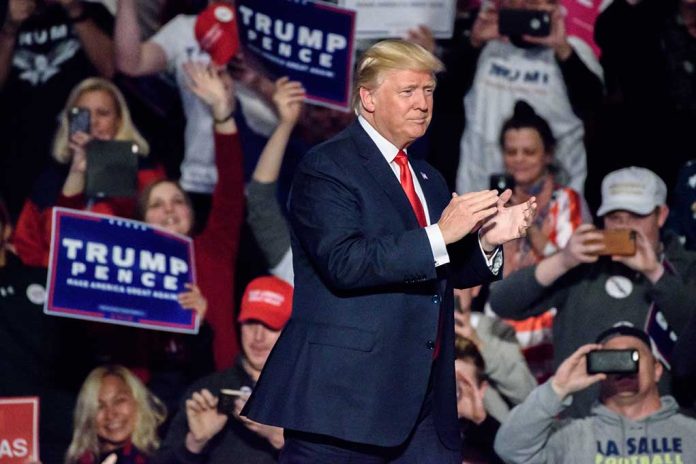
President-elect Donald Trump has extended an unprecedented invitation to Chinese President Xi Jinping for his upcoming inauguration, sparking both intrigue and concern in diplomatic circles.
At a Glance
- Trump invites Chinese President Xi Jinping to his inauguration, breaking with tradition
- The invitation comes despite Trump’s plans for aggressive policies towards China
- Historians note no foreign head of state has ever attended a U.S. presidential inauguration
- Trump’s team frames the invite as fostering dialogue with both allies and adversaries
- The move raises questions about future U.S.-China relations under a second Trump administration
A Diplomatic Surprise
In a move that has caught many by surprise, President-elect Donald Trump has invited Chinese President Xi Jinping to attend his upcoming presidential inauguration. This invitation, first reported by CBS News, marks a significant departure from historical precedent and raises questions about the future of U.S.-China relations under a potential second Trump administration.
The invitation to Xi comes at a time when Trump has been vocal about adopting a strong stance on China. His campaign rhetoric has included promises of imposing substantial tariffs on Chinese goods and addressing various bilateral issues decisively. This juxtaposition of a diplomatic gesture alongside tough policy proposals has left many observers puzzled about Trump’s true intentions regarding U.S.-China relations.
Trump has invited China’s President Xi Jinping to his inauguration https://t.co/rbxR8JieaQ
— Financial Times (@FT) December 12, 2024
Breaking with Tradition
Historian Jim Bendat has pointed out the unprecedented nature of this invitation. According to Bendat, no previous U.S. presidential inauguration has been attended by a foreign head of state. This break from tradition has led to mixed reactions from political analysts and historians alike.
“It’s not necessarily a bad thing to invite foreign leaders to attend,” says Jim Bendat.
While it is common to invite foreign dignitaries such as ambassadors to inaugurations, the inclusion of a head of state, particularly from a nation that is often viewed as an adversary, is highly unusual. This departure from norm has led to speculation about Trump’s diplomatic strategy and its potential implications for U.S. foreign policy.
President Xi Jinping on Thursday extended congratulations to Donald Trump on his election as president of the United States, urging the two countries to find the right way to get along in the new era.
President Xi called for the two countries to strengthen dialogue and…
— Chinese Mission to UN (@Chinamission2un) November 7, 2024
Trump’s Rationale
Trump’s press secretary, Karoline Leavitt, has framed the invitation as part of a broader strategy to engage with both allies and adversaries. This approach, according to Leavitt, is consistent with Trump’s previous term, where he faced criticism for his willingness to dialogue with various world leaders.
“This is an example of President Trump creating an open dialogue with leaders of countries that are not just our allies, but our adversaries and our competitors too,” explains Karoline Leavitt. “We saw this in the first term. He got a lot of criticism for it, but it led to peace around the world. He is willing to talk to anyone. He will always put America’s interest first.”
Despite this open-door approach, Trump’s campaign has simultaneously signaled a tough stance on China. He has appointed several China hawks to key positions, including Senator Marco Rubio as Secretary of State and Representative Mike Waltz as National Security Adviser. These appointments, coupled with Trump’s promises to impose hefty tariffs on Chinese imports, paint a complex picture of his intended China policy.
Implications for U.S.-China Relations
The invitation to Xi comes at a time of strained relations between the U.S. and China. Issues such as China’s perceived support for Russia’s actions in Ukraine, concerns over North Korea, and ongoing disputes in the South China Sea and Taiwan have all contributed to tensions between the two nations. Trump’s invitation, while potentially opening a channel for dialogue, does not necessarily signal a softening of his stance on these issues.
As the inauguration day approaches, the diplomatic community and international observers will be watching closely to see whether President Xi accepts the invitation and what this could mean for the future of U.S.-China relations. Regardless of the outcome, Trump’s unconventional approach to diplomacy continues to challenge traditional norms and keep both allies and adversaries guessing about America’s next moves on the global stage.
Sources:
- Trump invites China’s Xi to his inauguration even as he threatens massive tariffs on Beijing
- Trump’s inauguration invites include China’s Xi Jinping
- Trump invites China’s Xi to next month’s inauguration
- Donald Trump Invited China’s Xi to Presidential Inauguration: Report






